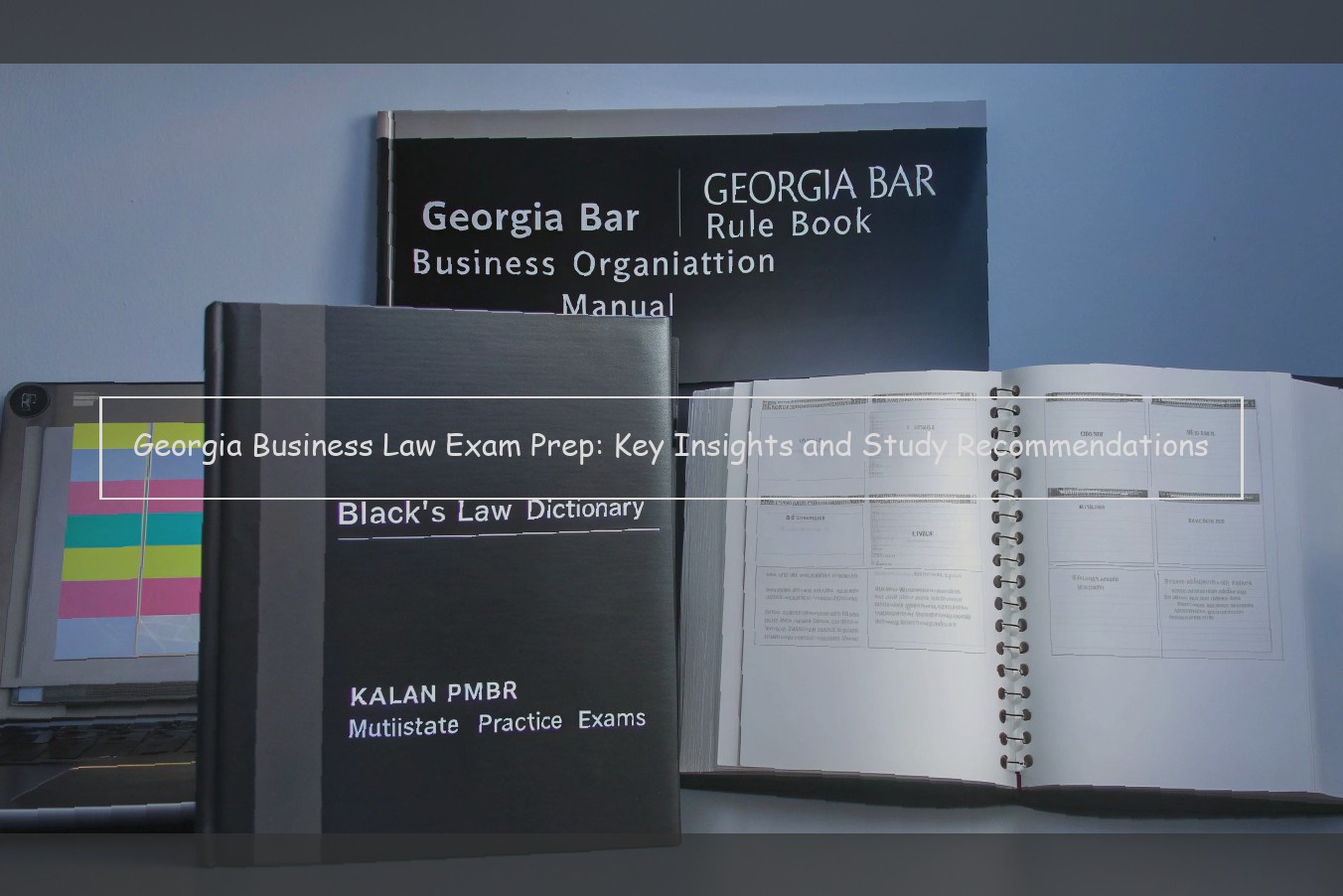
Format of the Georgia Business Law Exam
The Georgia Business Law Exam is a comprehensive two-hour examination comprised of multiple-choice questions that cover five substantive areas of Georgia’s business law. The substantive areas on the Georgia Business Law Exam are agency law, domestic article 9, federal securities, UCC articles 3 and 5, and commercial paper. Each area of business law makes up a certain percentage of the exam, for example, 20% in which 50% of the exam consists of Georgia Business law, about 50 multiple choice questions . The multiple-choice with selected answers consists of 40 questions where you can answer any 20 that will be graded. There are a total of 200 questions that are randomly selected from the bank of questions to be used on the exam, and the exam is given only twice a year, in May and November. This two-hour exam is considered open book/on-screen with only the Georgia Bar Rule Book containing the Rules of Court, Rules of Professional Conduct, Local Rules, Lawyers’ Duties on Trust Accounts, and Standards for Imposing Lawyer Discipline.
Topics Covered in the Georgia Business Law Exam
The scope of business law is vast, and the Georgia Business Law exam seeks to cover the most critical and relevant topics that practitioners will encounter in the field. The topics tested focus on federal and state laws, regulations, and rules, including specific provisions set forth and enforced by state boards in Georgia. In addition, contract law is a major emphasis of the exam as are federal and state laws related to employment, intellectual property, and securities regulation. These core subject areas are frequently encountered by businesses throughout Georgia, making them important focal points for the test as a whole. The following is a closer look at the major topics and areas of law that candidates can expect.
Helpful Study Tools and Exam Preparation
Your study schedule should start at least 2-3 months before the exam, but can span anywhere from 4-6 months or longer depending on your knowledge of the subject. The basic study schedule for Georgia Test Study Materials is:
Georgia Business Law Study Materials
Georgia Bar Business Organization Manual
Black’s Law Dictionary 2nd
Kaplan PMBR Multistate Practice Exams
The Bar Passer
For Foreign-Educated Candidates
Preparing for the Bar Exam: A Manual for the Foreign-Educated Candidate, 6th Edition
I am also offering BarBri’s Bar Review Course on Thursday evenings beginning in January. The course is designed to run through April 17, 2010. One week will be dedicated to Georgia Law, two weeks to Georgia Rules of Evidence, one week to Legal Ethics (including N.C.C.P.R.), one week to Addressing Professionalism and Civility in a Litigated Case, as mandated by the State Bar of Georgia, and one week to an overview of the Georgia portion of the exam (Business Organization, Commercial Paper, Debtor-Creditor, Civil Procedure, Agency, Criminal Procedure, Constitutional Law, Equity, and Wills/Trusts).
This course is offered both via Live and via DVD.
Ten Ways to Study Effectively
- Analyze the exam. The exam data provided by the NCBE is a great place to start your study preparation.
- Read your notes from class. Reading is great. But don’t just read. Think critically about what you are reading, try to explain the answer to a practice question based on it. You’ll be surprised how well these two acts work together to make the material relevant and memorable.
- Create a study calendar. Preparing for the bar is an arduous process. You need to keep track of your progress. Karen won the 2003 Barbri Chugger award for most hours of study logged in an attempt to pass the MBE. Beano the Barbarian couldn’t have put in more time. You must work every day and set goals. The only way to achieve them is to work for them. A calendar will help you track your progress.
- Not every study hour is created equal. When studying, set immediate goals. Be specific and realistic. If evidence is not your best subject, focus on it first. If you don’t pass, it’s not because you wrote well on civil procedure. Also, break study sessions into 50-minute increments. Stay focused during these sessions, and take 10-minute breaks afterwards. Four study hours = 3.5 hours of actual studying. Don’t waste your time on something that distracts you easily.
- Use mnemonics. Remember the acronym used to remember the US presidents? It is funny and easy to say, thus it is easy to remember.
- Make outlines. Outlining a chapter forces you to carefully read it.
- Have your study materials ready when you start the BarBri review classes. If you are missing any material, contact either of us immediately.
- Maybe you didn’t study Economics or Accounting in school. Either way, you need to read the Federal Banking Law (p. 3-25 to 3-47) and the Accounting from the Commercial Paper (p. 1-16 to 1-21). These subjects are on the exam. Preparation beforehand is very important.
- When outlining your essay answers, remember to use the IRAC method. This means Issue, Rule, Application, and Conclusion.
- Remember to keep it simple and easy to read. Avoid writing for style or impressing the graders; they are not aware of those things.
Common Pitfalls and How to Avoid Them
Time management can be a challenge, as the Georgia Business Law Exam is broken down into three parts – Business Law, Ethics, and the Notary Public Exam. Initially, this can seem overwhelming, especially because the test taker is not provided any information regarding time allotments for the various sections of the exam. However, with a little focus and time, time management can be mastered, leaving enough time to review all the material and formulate an appropriate response for each question. In the past, I have completed it in reverse, reviewing everything from memory first, then going to the book for specific answers. This has resulted in poor time management, so now I do the following: Additionally, Organization is a challenge. Knowing where to find the appropriate information regarding the various statutes is key, without having to spend so much time searching to find what you are looking for. Early on, I made specific tabs in the law book for the most common questions and cross-references used , as well as the two index tabs, so I could quickly find the topic, and the page of the review course. Once this was accomplished, there was no more need to waste time by cross referencing the indexes (which can be very confusing), looking for the right information, and then deciding if the reference was relevant and correct. Also, note that most of the questions in the business section involve either filings, identification documents or record searches. Even if the wording of the question appears to be about something else, at its core, there is a filing, identification number, or records research aspect, so look for it. On occasion, the question is phrased incorrectly, requiring the test taker to choose what they perceive to be the correct answer. Here, it is important to note the center questions in the choices presented, as they are related to the other two. I will note those, but then ultimately pick the one option that seems to be the right option. This occasionally happens.
Exam Important Dates and Registration Process
The Georgia Business Law Exam is held twice a year, typically in April and September. The exact dates for the exam are announced by the Georgia Office of Secretary of State several months in advance on their official website. To register for the exam, candidates must complete an online application process through the Georgia Secretary of State’s website, which usually opens up about seven weeks before the exam date. After completing their application, candidates are required to pay an examination fee, which at this time is $120, though it’s advisable to verify the most current fee schedule.
Along with the examination fee, candidates must also provide supporting documentation, including proof of citizenship or lawful presence in the United States, and they may be required to submit additional information depending on their educational background and other factors. Candidates should ensure that all documentation is submitted and that their application is completed in full prior to the deadline. Typically, candidates have about two weeks, from the initial opening date of the application portal until the cut-off date, to complete their application and submit all the necessary documentation. There are no exceptions given for late applications; all candidates must abide by the registration deadlines in order to sit for the exam.
Tips from Previous Georgia Business Law Examiners
We asked previous Georgia Business Law Exam takers how they study for the exam, tips for test day, and other advice they would give to an individual who is planning to take the exam. The first step, according to a recent passer, is to "familiarize yourself with the material that will be covered on the test. I was fortunate enough to be able to take a commercial rules course which quickly reviewed the majority of the material that is covers. Just make sure you review the subjects intense[ly] so that you are familiar with how to look up the information if you don’t have it memorized. Second, write out a study plan and stick to the plan. Third, BE CONFIDENT. The Georgia Bar provides an enormous amount of resources but if you don’t go in and test into the passing range you will not pass, so make sure you have confidence in your abilities to look up the rules and follow the instructions of the questions which tells them what they are asking for." A second former test taker agrees and adds, "Get a bar review book and study the subjects that you are unsure about. The process of reading through 40 pages to understand typically only one to two paragraphs can be exhausting and confusing but needs to be done for success . Be sure to practice problems and go through the Georgia Bar comment on each problem to understand why your answer may have been incorrect. Although the bar review book is a great guide I suggest speaking with attorneys or professors who have passed the exam to get their insight on the practical portions and commonly overlooked areas." Another helpful tip from an individual who passed the exam includes, "[I studied for three months and was able to pass with only three days left in my subscription! I’m telling you, I waited until the last minute of this bar review!] I honestly didn’t really study until the last two weeks of my subscription, and by that time, I hadn’t read any of the material, that’s why I only got like a 74. I had 4 contracts, 1 UCC, 1 agency and partnerships, 2 Wills and 2 Corporations. A Georgia Bar review outline ‘reviewed’ on the subjects helped. It gave me a headstart on understanding the material, after that I would look at the flowcharts and then go straight to the comments of the Georgia Bar exam so I wouldn’t be overwhelmed and confused on the day of the exam. I’ve made a personal study plan I’ll follow for the next exam I am preparing for. I didn’t experience burnout, I didn’t want to have to pay for another subscription or worry about my Georgia license, so I studied all the time."


